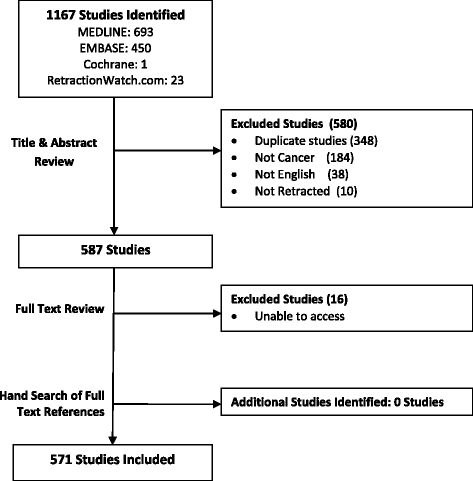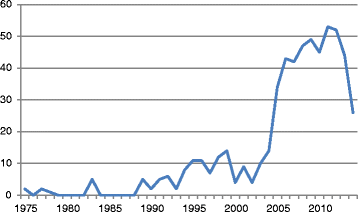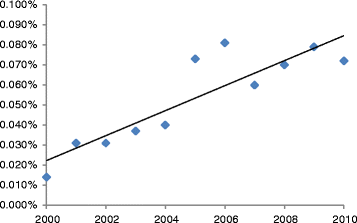Retractions in cancer research: a systematic survey
- PMID: 29451549
- PMCID: PMC5803635
- DOI: 10.1186/s41073-017-0031-1
Retractions in cancer research: a systematic survey
Abstract
Background: The annual number of retracted publications in the scientific literature is rapidly increasing. The objective of this study was to determine the frequency and reason for retraction of cancer publications and to determine how journals in the cancer field handle retracted articles.
Methods: We searched three online databases (MEDLINE, Embase, The Cochrane Library) from database inception until 2015 for retracted journal publications related to cancer research. For each article, the reason for retraction was categorized as plagiarism, duplicate publication, fraud, error, authorship issues, or ethical issues. Accessibility of the retracted article was defined as intact, removed, or available but with a watermark over each page. Descriptive data was collected on each retracted article including number of citations, journal name and impact factor, study design, and time between publication and retraction. The publications were screened in duplicated and two reviewers extracted and categorized data.
Results: Following database search and article screening, we identified 571 retracted cancer publications. The majority (76.4%) of cancer retractions were issued in the most recent decade, with 16.6 and 6.7% of the retractions in the prior two decades respectively. Retractions were issued by journals with impact factors ranging from 0 (discontinued) to 55.8. The average impact factor was 5.4 (median 3.54, IQR 1.8-5.5). On average, a retracted article was cited 45 times (median 18, IQR 6-51), with a range of 0-742. Reasons for retraction include plagiarism (14.4%), fraud (28.4%), duplicate publication (18.2%), error (24.2%), authorship issues (3.9%), and ethical issues (2.1%). The reason for retraction was not stated in 9.8% of cases. Twenty-nine percent of retracted articles remain available online in their original form.
Conclusions: Retractions in cancer research are increasing in frequency at a similar rate to all biomedical research retractions. Cancer retractions are largely due to academic misconduct. Consequences to cancer patients, the public at large, and the research community can be substantial and should be addressed with future research. Despite the implications of this important issue, some cancer journals currently fall short of the current guidelines for clearly stating the reason for retraction and identifying the publication as retracted.
Keywords: Cancer; Cancer research; Oncology; Oncology research; Research ethics; Retraction; Retractions.
Figures




References
LinkOut - more resources
Full Text Sources
Other Literature Sources

